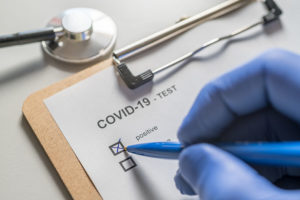Employers Can Require COVID-19 Testing for New and Returning Employees but Cannot Mandate Antibody Tests
 Employers welcoming furloughed or new employees back to work after COVID-19 shutdowns face a myriad of unique employment law issues and challenges. Many, if not most, of these involve how to keep employees, customers, and patrons safe in ways that are practical, effective, and in conformity with the law. This includes ensuring that infected workers do not enter the workplace. But what steps and screening efforts can employers undertake without running afoul of the Americans with Disabilities Act (ADA) and other anti-discrimination laws?
Employers welcoming furloughed or new employees back to work after COVID-19 shutdowns face a myriad of unique employment law issues and challenges. Many, if not most, of these involve how to keep employees, customers, and patrons safe in ways that are practical, effective, and in conformity with the law. This includes ensuring that infected workers do not enter the workplace. But what steps and screening efforts can employers undertake without running afoul of the Americans with Disabilities Act (ADA) and other anti-discrimination laws?
COVID-19 guidance issued by the Equal Employment Opportunity Commission (EEOC) addresses many of the issues companies confront when deciding what measures they may take for new and returning employees, as well as for job candidates.
COVID-19 Virus Testing and Other Permissible Screening Protocols
Ensuring that employees who exhibit symptoms of COVID-19 stay at home and away from the workplace is an indispensable element of workplace safety. But, as we all know by now, plenty of individuals with the virus are asymptomatic, even though they can infect others with COVID-19. As such, testing for the virus is an important tool for screening infected individuals who do not show any visible symptoms of the disease.
Under the ADA, employers can require employees to take medical tests that are “job-related and consistent with business necessity.” According to the EEOC guidance, keeping infected individuals from spreading the virus to coworkers and customers is clearly “consistent with business necessity.” As such, “employers may take steps to determine if employees entering the workplace have COVID-19 because an individual with the virus will pose a direct threat to the health of others.” This includes electing to administer COVID-19 tests to employees before they enter the workplace to determine if they have the virus.
In addition, the EEOC says that employers can also take the following steps to screen existing employees and job candidates for COVID-19:
- During the pandemic, ADA-covered employers may ask their employees if they are experiencing symptoms of COVID-19 such as fever, chills, cough, shortness of breath, or sore throat.
- Because the CDC and state/local health authorities have acknowledged community spread of COVID-19, employers may measure employees’ body temperatures as a precaution.
- Employers may screen job applicants for symptoms of COVID-19 after making a conditional job offer, as long as they do so for all employees in the same types of jobs.
- Employers may require employees who had COVID-19 to submit a clearance from a physician if they wish to return to work.
- Employers must keep all information about employee illness as a confidential medical record in compliance with the ADA.
Employers Cannot Require Antibody Tests
Testing employees to determine whether they currently have the virus and thus threaten the health and safety of others is one thing. Testing workers for coronavirus antibodies to determine whether they were previously infected is another, according to the EEOC.
The EEOC refers to the CDC’s Interim Guidance on antibody testing in which it states that antibody test results “should not be used to make decisions about returning persons to the workplace.” According to the EEOC, the CDC’s guidance means that antibody tests at this time do not meet the ADA’s “job-related and consistent with business necessity” standard for medical examinations. “Therefore, requiring antibody testing before allowing employees to re-enter the workplace is not allowed under the ADA,” according to the EEOC.
Compensating Employees for Time Spent Undergoing Required Testing
If an employer requires its workforce to undergo COVID-19 virus testing as a condition of employment, it likely must compensate employees for the time they spend taking the test as well as the time they spend going to and from a testing facility.
While the Department of Labor (DOL) has not issued any definitive guidance on this point, mandatory virus testing is analogous to mandatory drug testing. The DOL has previously opined that compulsory drug testing during or outside of working hours “constitutes hours worked for FLSA purposes” for which employees must be paid. Additionally, it is the DOL’s position that employers must also compensate workers for the time they spend traveling to and from the test.
Contact Kreis Enderle With Your COVID-19 Employment Questions
If you have questions about employment issues related to the COVID-19 pandemic, including what you can and cannot do to protect your workforce and your customers, the employment law attorneys at Kreis Enderle are here to provide you with answers.